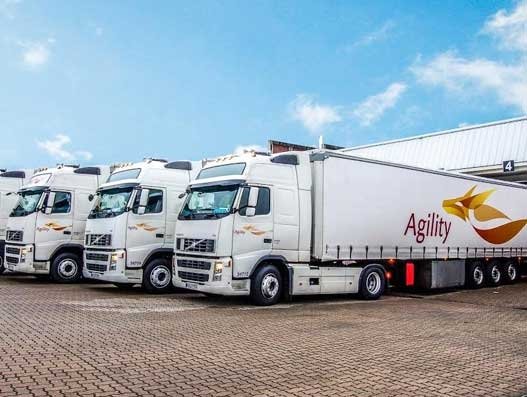
Agility reports drop in Q3 air freight volumes as trade concerns linger
Nov 14,2019: Global logistics provider Agility’s third-quarter earnings reflected a drop in air freight volumes weighed down by “trade concerns and lower demand from customers across industries and geographies.” The Q3 air freight volumes slid 15.8 percent (in tonnage) but this decline in volume was partially offset by higher yields – expressed as net revenue/tonne […]

Nov 14,2019: Global logistics provider Agility’s third-quarter earnings reflected a drop in air freight volumes weighed down by “trade concerns and lower demand from customers across industries and geographies.” The Q3 air freight volumes slid 15.8 percent (in tonnage) but this decline in volume was partially offset by higher yields - expressed as net revenue/tonne – which increased 15.5 percent. As a result, air freight net revenue decreased 2.8 percent versus the same period a year ago.
Year to date, earnings were 38.2 fils per share and net profit was KD 63.6 million, up 7.9 percent (or 11.3 percent excluding IFRS 16 impact). Year-to-date EBITDA was KD 142.4 million, an increase of 24.9 percent (or 6.4 percent excluding IFRS 16 impact). Revenue for the first three quarters was KD 1,175.8 million, an increase of 2.2 percent.
“Our infrastructure portfolio of companies drove our results in the third quarter, with all major entities seeing growth. Our Global Integrated Logistics (GIL) business, on the other hand, was affected by challenging market conditions and trade-war headwinds that have affected the industry as a whole,” Tarek Sultan, Agility vice chairman and CEO, said. “Even so, GIL is moving forward aggressively with its digitization agenda to improve operational efficiency and drive a better customer experience.”
Sultan added, “We continue to invest in technology-driven change and seek to be the digital leaders in our industry. Our Agility Ventures team is partnering with innovative start-ups that are re-shaping the supply chain in areas ranging from green technologies to e-commerce. We are also accelerating in-house development, acquisitions, and partnerships to grow our digital logistics platform, Shipa. We believe this is the key to differentiating Agility and positioning us for future growth.”
Agility Global Integrated Logistics (GIL)
GIL EBITDA was KD 7.8 million (excluding IFRS 16 impact), a 1 percent decline from same period in 2018. The decrease was due to higher operating expenses related to new facilities, as well as investments in digital transformation.
GIL gross revenue was KD 285 million, a 2.4 percent decline (or 0.7 percent decline on a constant currency basis) from same period in 2018 due to challenges within the freight forwarding industry. GIL’s Q3 net revenue was KD 67.3 million, a 4 percent increase (or 5.3 percent increase on a constant currency basis) vs. Q3 2018. The net revenue increase was driven mainly by growth in ocean freight, project logistics and contract logistics. The overall net revenue margin was 23.6 percent in Q3 versus 22.2 percent in Q3 2018.
Ocean freight TEUs fell 9.3 percent, but Q3 yields improved 13.7 percent versus the same period in 2018. GIL Ocean freight yields were strongest in the Americas and Europe. Ocean freight net revenue improved 3.2 percent as compared with Q3 2018.
Contract logistics posted healthy growth, mainly in the US, Australasia, India and Singapore, with the MEA region continuing to perform well. Project logistics also showed solid and increased growth.
Excluding IFRS 16 impact, year-to-date GIL EBITDA was KD 24.5 million, flat vs. the same period in 2018. Year-to-date net revenue improved 2.7 percent, and revenue fell 2.1 percent.
To strengthen performance and its market differentiation, GIL is implementing its digital strategy. By accelerating its digital transformation, GIL intends to enhance customer and supplier connectivity, create innovative complex customer solutions, increase the efficiency of its business processes, and enable comprehensive business insight.
Agility’s Infrastructure group EBITDA rose 3.8 percent to KD 32.6 million in the third quarter. Revenue reached KD 119.7 million, an increase of 13.4 percent. For the nine months, EBITDA grew 8.3%; and revenue increased 14.5 percent (all numbers exclude IFRS 16 impact).
Agility Logistics Parks (ALP) reported a 14.2 percent increase in third-quarter revenue as compared with the same quarter in 2018. Revenue from facilities completed in late 2018 contributed to strong results, as did yield improvement at existing facilities. Near-term growth will be driven by development of new logistics parks and warehouses in Saudi Arabia and Africa, along with optimization of the company’s land bank in Kuwait.
Tristar, a fully integrated liquid logistics company, posted 9.6 percent, revenue growth in the third quarter, driven by increases in road transport, warehousing operations and the shipping business, in addition to business wins from new and existing customers. Tristar continues to execute and to look for opportunities to unlock additional value for its shareholders.
National Aviation Services (NAS) revenue rebounded, growing 8.5 percent in Q3 after a difficult start to the year. NAS’s first-half performance was hurt by unforeseen regulatory and operational expenses in Kuwait, price reduction in Cote d’Ivoire, and a temporary reduction of flights in and out of Afghanistan. NAS expects improvement in results to continue into Q4 and 2020. Operations in Mozambique, Tanzania and Morocco remain in launch phases and are hindering group performance, but Uganda, Jordan and Egypt continue to outperform.
United Projects for Aviation Services Company (UPAC) posted Q3 revenue growth of 1.4 percent. UPAC operations are still being affected by the shift in passenger traffic to dedicated airline terminals at Kuwait International Airport. UPAC has been able to offset the impact by generating new revenue from car park management operations in (T4) and through the strong performance of its real estate management operations in Kuwait. In Abu Dhabi, construction continues to progress on Reem Mall, a $1.2 billion project.
GCS, Agility’s customs modernization company, posted revenue growth of 8.2 percent in Q3. Gains were driven by implementation of new services in customs operations, digital services for the trade community, and port operations. GCS continues implementing digital initiatives to drive efficiency and improve profitability.

